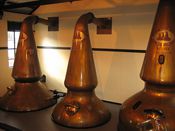Whisky / Whiskey
Whisky, from the Irish uisce beathadh or Scots Gaelic uisge beatha, an adaptation from the Latin aqua vitae meaning "water of life", this is the spelling used by the Scots and the Canadians. Whiskey is what Americans and Irish call their famous eau de vie. Whisky is a grain spirit made from malted barley, unmalted barley, rye or corn, depending on where it's produced. Barley is the key ingredient of Scottish Whisky and Irish whiskey. Scottish whisky or simply Scotch is generally malted whereas Irish whiskey may be both malted and unmalted.

Canadian whiskies are blended multi-grained whiskies made form corn, rye, and barley. Each producer will have their own specific method for combinations of grains for the mash but generally most Canadian whiskies will have a higher percentage of rye and are often termed "rye whiskies". Bourbon, America"s "native spirit" is made from corn or maize which may also include wheat, rye or malted barley. The natural clear spring water from limestone sources, is a key ingredient of Bourbon which allows us to differentiate between Bourbon and other corn whiskeys. Bourbon production is governed by strict statutory laws. The whiskey must not have less than 51% corn; it must be distilled at a minimum alcoholic volume of 80 % (160 Proof); the use of any kind of additive, with the exception of distilled water, is not allowed and it must be bottled at a minimum alcohol volume of 40%. The Whiskey produced according to these guidelines is called "Straight Bourbon".
Who came first, the Scots or the Irish? There is a little bit of a controversy here. We don't know who first distilled Whisky but we can be sure that both contributed to its dissemination and subsequent production in the United States. According some Historians Irish monks started making Whisky more than a thousand years ago, but written references only date back as far as medieval times. By the 17th century Scottish Lords had their own distilleries. At that time Scotland was at odds with the British Government, who inevitably had trouble collecting taxes from the distillery owners. Despite this, whisky production started to be controlled by the government as from 1814.
The first distilleries in the United States date back to 1640, after the arrival of Irish and Scottish immigrants who came to America to escape economic hardship. These immigrants brought their stills along with them when they crossed the Allegheny Mountains into Kentucky, then Virginia, where Bourbon Whiskey was born. Bourbon gets its name from Bourbon County Kentucky where it was once produced. An abundance of corn crops in that region together with the ingenuity of the early settlers led to its distillation, revolutionizing the history of American Whiskey.
Whisky is produced in 4 stages: malting, mashing, fermentation and distillation.
For Scotch Whisky production, when malting barley, grains are allowed to germinate so enzymes may prepare the starches present for sugar conversion. It is then fast dried to stop further plant growth. Before germination barley is mixed and sifted to remove all foreign matter. It is then soaked in special tanks for two to three days and then spread out over a large area in order to germinate. Germination takes about 8 to 12 days (depending of the region) and is interrupted when the germinated seed is about one inch in size. This Green malt is then rapidly dried in greenhouses or in furnaces heated with turf fire (kilns). For Scotch the quality or characteristics of the whisky depend on the turf fire utilized as the peat imparts a smoky flavour to the malt. Irish whiskey differs from Scotch in that the drying of the mash is not subjected to the smoke of the peat as it is dried in closed kilns. Later still the malt is cooled and stored for a month.
In the mashing stage the malt is mixed with hot boiling water in a vessel called the mash tun and after a couple of hours the starch is transformed into maltose. The result is a sweet liquid - wort, which is transferred to another tank, the underback where the wort is cooled off before fermentation.
Fermentation of the wort takes about 48hours. Yeast is added for converting the sugar into alcohol.
The liquid resulting from fermentation is twice distilled in large copper pot stills with a conical neck and extended lyne arm. Irish whiskeys undergo a triple distillation The design allows for the reflux of the condensed vapours allowing for a purer distillate. This distillate has an alcoholic volume of between 35% and 65%. You can distil your own whisky doing a double distillation with a traditional copper alembic still (Soldered Union Alembic Still or Riveted Union Alembic still) or a copper Alembic still with reflux column.
Scotch, Canadian or Irish whiskey is aged in old oak casks which may have been used to store Bourbon, Sherry or Port wine. Scotch and Irish whiskey may be aged from 3 to 9 years or more whilst Canadian whiskey must be aged for at least three years in a barrel but are usually aged for up to 6 years.
Bourbon, on the other hand must be stored for at least two years in new, charred, white oak barrels.

